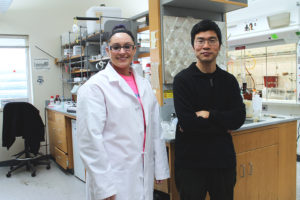By Kara Rogers
Stephanie Ann Blaszczyk, a PhD student in the UW–Madison Department of Chemistry and student researcher in the Tang Laboratory at the UW–Madison School of Pharmacy, is dedicated to the study of chemical synthesis and the biological evaluation of carbohydrates—a winning combination underlying her recent selection as a recipient for the National Institutes of Health (NIH) Chemistry-Biology Interface (CBI) Predoctoral Training Program. The CBI training program at UW–Madison, one of the largest and oldest programs of its kind in the country, gives graduate students an opportunity to expand their knowledge and research at the chemistry-biology interface.
Through the CBI program, Blaszczyk, who is a second-year PhD student in chemistry, will receive two years of funding to continue her research on carbohydrates. As a CBI trainee, she is required to take a graduate-level course in chemical biology, and she will participate in a 12-week industrial internship. Previous CBI trainees carried out their 12-week internships at facilities such as Abbott Laboratories, Argonne National Laboratory, GlaxoSmithKline, and 3M.
“I consider myself to be a nontraditional student,” Blaszczyk says. “After receiving my undergraduate degree, I went to industry and then came back to study as a graduate student. The CBI grant gives me a critical opportunity to further my site-selective functionalization project for carbohydrates and to study carbohydrates from a biological perspective.”
“She has a deep passion for the study of chemical and biological aspects of carbohydrates.” –Weiping Tang
Blaszczyk applied for the CBI training grant when she realized that the grant would give her more freedom to pursue her line of study. She was nominated for the award by Professor Weiping Tang, who is her research mentor. Tang is both a professor in the Pharmaceutical Sciences Division of the School of Pharmacy and a professor in the Department of Chemistry.
“I nominated Stephanie for a CBI training grant because she has been an efficient and extremely productive member of my laboratory,” says Tang, who also is a CBI program trainer. “Her contributions to multiple review and research articles have been outstanding, and she has a deep passion for the study of chemical and biological aspects of carbohydrates.”

The School of Pharmacy has been a longtime champion of the CBI program, which was initiated at UW–Madison in 1992 by Dan Rich, now School of Pharmacy professor emeritus. Rich organized and wrote the first CBI training grant for the university and helped launch the UW–Madison program in chemical biology. More than two-and-a-half decades later, his leadership in the CBI program continues to impact graduate students in chemical biology at UW–Madison, providing them with opportunities for training in both chemistry and biology.
The CBI program is strongly interdisciplinary, drawing on the expertise of some 50 faculty members in departments across campus, and thereby ensuring that the program provides students with training in synthetic and mechanistic phenomena that are relevant to chemistry and biology. In addition to its interdisciplinary aim, the program has a dual-training focus: improving scientists’ ability to carry out and communicate their research in the contexts of chemistry and biology and aiding the education of scientists who are interested in solving problems through a combination of chemical and biological approaches.
Former CBI trainees have enjoyed successful careers. Some have remained in academia, serving as lecturers and professors at major research universities, while others have gone on to work for government agencies or have transitioned into industry, working for companies such as 3M, Intel, Pfizer, and Dow AgroSciences.
For more information about the CBI training program, visit the National Institutes of Health or download a brochure about the UW–Madison CBI program.